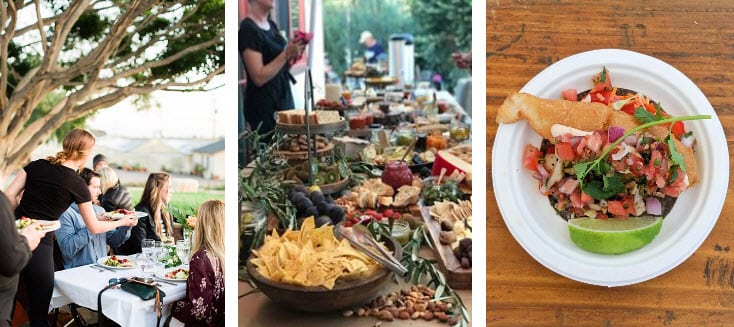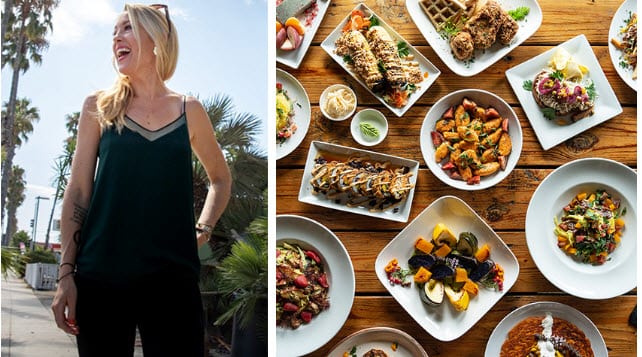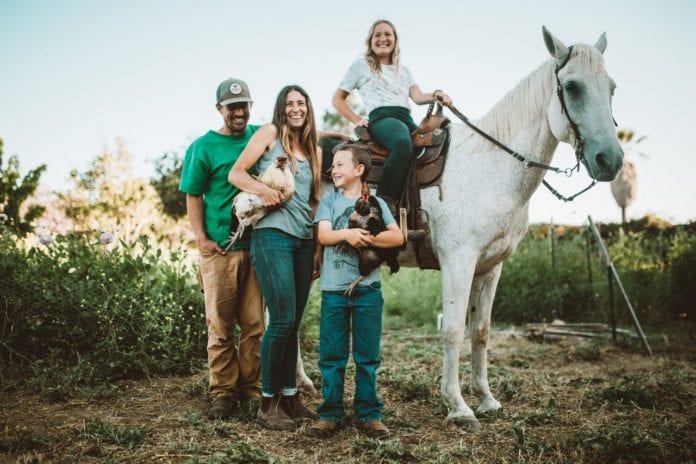The New Year is a time of self-reflection, when many people make changes to improve their lives and set goals for the year ahead. So, this month, Oceanside has reaffirmed its commitment to becoming a zero-waste city and highlights local champions who are helping move the needle.
The Food and Agriculture Organization (FAO) of the United Nations estimates that one third of the food produced globally is wasted. At the same time, one in five people in the U.S. are struggling with food insecurity. Now is the time to make changes to eliminate waste and create a sustainable food system for the betterment of our community and planet.
Oceanside has teamed up with Waste Management to launch the Food Scraps Recycling Program. Effective January 1, all city businesses are required to separate and recycle their food waste (also known as organics), which will be processed as renewable energy or reusable materials. Organics include meat, bones, dairy, bread, fruits, vegetables, peels, pits and coffee grounds, as well as all food-soiled paper products such as napkins, egg cartons and pizza boxes. The new program will provide education and training to prepare local businesses and restaurants for the new recycling requirements, and will begin weekly collection of commercial food waste bins starting in the spring.

The Green Oceanside Kitchen’s commercial kitchen and event space. Photo Credit: @osidekitchencollaborative
The City’s Green Oceanside initiative delivers programs to educate residents, businesses and visitors on the importance of resource conservation and promotes environmental practices. Last year, the Green Oceanside Kitchen opened, a state-of-the-art commercial kitchen built to support local food recovery and preservation. In a public-private partnership, the Green Oceanside Kitchen also serves as the culinary workspace for fellow zero waste advocate, the O’Side Kitchen Collaborative.

Waste Not, Want Not: Conscious Catering That Tastes O’ So Good
O’Side Kitchen Collaborative (OKC) is a local non-profit focused on creating a sustainable food system through three core practices: food rescue, conscious catering and zero waste education. OKC partners with community organizations, farmers and gleaning programs, like Produce Good and Senior Gleaners, to divert agricultural seconds and surplus from the landfill and into the mouths of the community. OKC uses recovered fresh ingredients to prepare delicious, seasonal dishes for its conscious catering clientele. They also package healthy, preserved products, like OKC’s signature pesto made from carrot tops and bottoms, to nourish the community.
Green Oceanside Kitchen is the home base for OKC’s catering operations, which serves groups as small as six and as large as 500 at weddings, corporate events and philanthropic fundraisers. Culinary creativity and a zero-waste philosophy are at the heart of OKC, which is constantly coming up with unique ways to turn food byproducts into nutritious meals. In November, OKC hosted a “Holiday Cheftovers” event where local chefs presented new recipes and practical tips for repurposing Thanksgiving leftovers. The goal was to minimize community-generated food waste, which can increase by as much as 25 percent between Thanksgiving and Christmas.

O’Side Kitchen Collaborative’s conscious catering and award-winning plant-based fish taco. Photo Credit: @osidekitchencollaborative
One of OKC’s goals is to show the community just how good zero waste food can taste. Case in point: OKC’s fried coconut fish taco, which recently won top prizes at LA’s Best Vegan Taco Competition and O’side Flavor. OKC created a gluten-free, tempura-battered taco that used coconut meat as its primary ingredient, a byproduct when making coconut milk or coconut water. Coconut meat looks a lot like fish when pulled from the shell and has wonderful flavor and texture, making it the perfect plant-based substitution for fish. Once fried and dressed with citrus jicama slaw, pico de gallo and chipotle cilantro aioli, it’s difficult to tell the difference between the traditional fish taco and the plant-based alternative.
Another reason the coconut taco beat the competition is the original citrus hot sauce created in OKC’s zero waste kitchen. “Citrus gleaned from fields that would otherwise end up in the landfill was made into hot sauce, and the hot sauce was the base for our salsas,” said Heather Sorgine, Director of Philanthropy at OKC. “We happened to have peaches and habanero, so we created a peach habanero hot sauce and when we have passion fruit, it’s a passion fruit hot sauce. What comes out of our kitchen is always changing based on what food is coming in.”
While focused on the community of Oceanside, OKC works with partners throughout North County in the common pursuits of a zero waste and a sustainable food system. One such partner is Misadventure & Company, a sustainable distillery out of Vista that recovers old bread products from food banks and bakeries and turns it into vodka. The starches and sugars in baked goods provide the building blocks for alcohol. So, Misadventure can recover six pallets of old biscotti and turn it into carbon negative vodka.
The Plot Reaps Flavor into Plant-Based, No Waste Dining
Jessica Waite is no stranger to Oceanside’s culinary scene. She and husband Chef Davin Waite co-own Wrench & Rodent and The Whet Noodle, two of South O’s most popular restaurants. The couple is putting the finishing touches on their newest culinary venture The Plot, which will offer an exclusively plant-based menu.
A vegetarian since age 8, Waite wants to create great tasting food that uses the entire plant and generates no waste. It will be a restaurant completely aligned with her values. “I’m trying to set a great example of high quality, super delicious food that happens to be completely plant-based while sourcing from local growers and vendors as much as possible,” said Jessica Waite, CEO of The Plot. “I want to source food in a way that is intentional and conscientious, and make decisions that are good for the planet.”

Jessica Waite, Owner of The Plot – Oceanside’s new plant-based restaurant. Photo Credit: The Plot
Waite has seen the public’s enthusiasm for vegan cuisine grow, and she knows that Oceanside is the perfect spot for The Plot to plant roots. The city is diverse and artistic and more importantly, open to trying new things. When exposing people to delicious, conscious cuisine, Waite also hopes to get them thinking about the little changes that collectively can make a big impact, like avoiding single-use plastic packaging when possible or buying local and organic.
At least 80 percent of The Plot’s produce will be sourced from local farms, and it will grow fresh ingredients from the restaurant’s own urban garden. The Plot will be open for breakfast and lunch, with a slightly upscaled menu for dinner service. The Plot has no plans to serve processed meat alternatives like the Impossible Burger or Beyond Meat but rather create plant-based twists on traditional dishes like a reuben sandwich prepared with beets and house spices and sloppy joes made using vegetables, nuts and mushrooms.
While Waite hopes The Plot can open people’s minds to both the flavors and benefits of a plant-based diet, she knows that what people really expect is great food and atmosphere. And on all fronts, Waite is prepared to deliver. The Plot is located at 1733 S. Coast Hwy.
Produce Grown in Oceanside, for Oceanside
According to the 2008 Farm Bill, “local” can mean less than 400 miles from a product’s origin or within the state in which it was produced. That means “local” produce can be picked, boxed and loaded onto a truck for transport in Northern California days before it hits the shelves in San Diego. While that produce is technically “local,” it tastes different and has a greater carbon footprint than the produce grown by farms in communities they serve.
Cyclops Farms is a certified organic farm that grows fresh, organic produce in Oceanside, for Oceanside. It sells direct to local restaurants and to the public at farmers’ markets and from its Saturday farm stand at 1448 Avocado Rd, and hosts quarterly farm-to-table events in partnership with local chefs. Luke Girling started the small family farm with a $150 investment, which he used to purchase 1,500 strawberry plants that he planted in his front yard. In 2015, Girling launched a Kickstarter campaign and raised a little over $15,000 to help him lease 2.5 acres and break ground on his urban farm.

Cyclops Farms grows certified organic produce in Oceanside. Photo Credit: Colin Leibold
While Girling grows carrots, lettuce, peppers, cherry tomatoes and watermelons, he is best known locally for his strawberry production. During prime growing season, Girling supplies produce to local restaurants including Mission Avenue Bar & Grill, LTH & Kitchen, Exhale, Privateer and Wrench & Rodent. And when he has an agricultural surplus, Girling offers the produce to local gleaners to make sure that the food doesn’t go to waste and gets into the hands of people that need it or can use it in some capacity.
“If I have extra stuff, I would rather give them away to people than see it go to waste,” Girling said. “Most big farms might do miles and miles of tomatoes and there is so much of it on the ground because it isn’t marketable. They’re still good for you! But they can’t sell it because it’ll just sit on the store shelves, so much of that food is wasted.”
Depending on what he plants in the ground, it takes 40-to-90 days before Girling yields produce. With Cyclops Farms now operating on a year to year lease, it’s difficult for Girling to plan too far ahead. He recently purchased a home in Morro Hills on four acres where he and his wife Frances started growing organic flowers to diversify his business.
The Girling family: Luke and Frances with their children Josie and Falcon. Photo Credit: Becka Vance Photography
“It’s an amazing property with gnarly ocean views,” said Girling. “Most farms are tucked away and pushed off to the side because that’s where the cheaper land is, but this piece of land is in the middle of town close to chefs and restaurants. It’s something really different, something special.”
Nothing would make Girling happier than seeing the land preserved by a conservation buyer that shares his small farm vision because he would keep leasing it from them and doing exactly what he’s been doing forever, if given the chance.
Everyday Tips to Reduce Your Waste
Below are some simple tips that everyone can use to create less waste and make our food system sustainable:
•Carefully plan meals and buy only the needed ingredients.
•Consider serving in-home meals family-style and use smaller plates to avoid the “eyes bigger than the stomach” syndrome
•Store leftovers in reusable containers to be frozen or shared with family and friends
•Try a new recipe to make use of all the leftovers that you have
•Compost fruit and vegetable scraps
•Make full-flavored soup stocks and sauces using meat, fish and poultry scraps
•Recycle your used cooking oil year-round at the waste management buy-back center (2880 Industry Street)
•When you have the option, avoid buying produce and products packaged in single-use plastics
If you have excess produce from fruit trees, contact local gleaners (Produce Good or Senior Gleaners) so it can be used by others in the community.


















